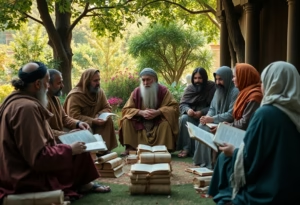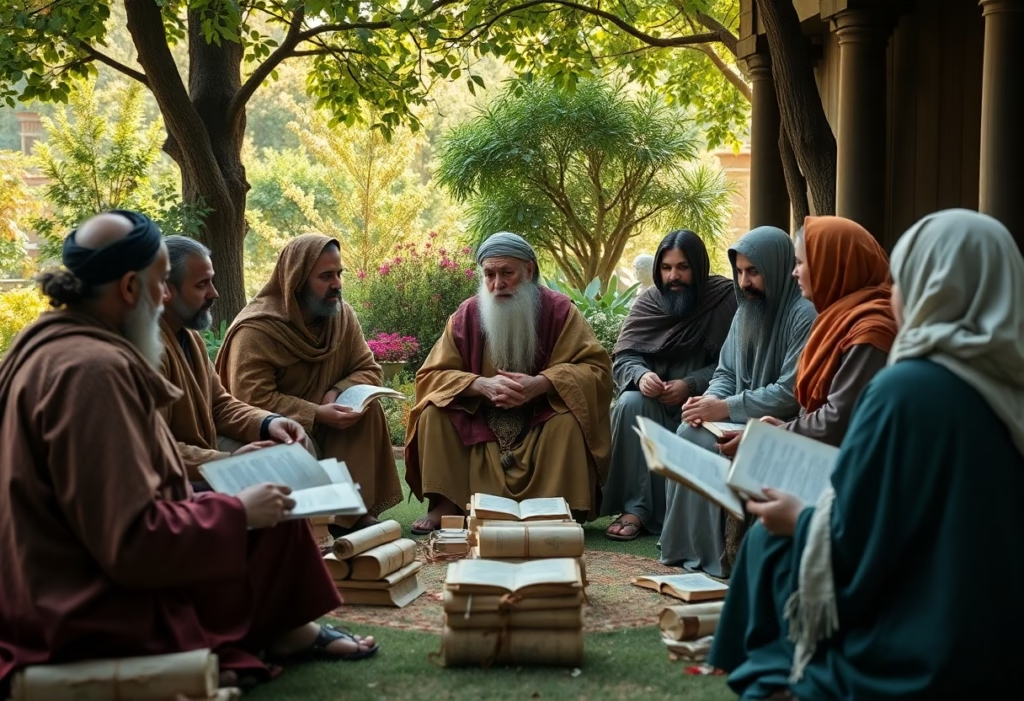Navigating the Roots of Conflict through Prophetic Teachings
Prophetic teachings provide a profound framework for understanding the underlying causes of conflicts. You might encounter situations where disagreements stem not just from personal grievances but from deeper issues like miscommunication or cultural misunderstandings. For instance, the Prophet Muhammad emphasized the importance of listening and empathy when resolving disputes, urging you to seek a comprehensive understanding of each party’s perspective. Utilizing the method of questioning, such as asking clarifying questions, can reveal the roots of tension while fostering an atmosphere of respect and openness. In this way, prophetic guidance allows you to navigate complex conflicts with a sense of purpose and direction.
The Path to Reconciliation: Lessons from the Prophet’s Life
Finding a path to reconciliation is often challenging, yet the life of the Prophet Muhammad illustrates how understanding, compassion, and clear communication can mend even the deepest rifts. Through personal encounters and community engagement, you can draw from his wisdom to foster unity and harmony among differing parties. His example showcases the importance of prioritizing relationships over personal grievances, emphasizing that reconciliation is not merely a goal but a continuous journey towards mutual respect and understanding.
Key Encounters that Shaped Conflict Resolution Approaches
Several pivotal moments in the Prophet’s life highlight his conflict resolution strategies. Instances such as the Treaty of Hudaybiyyah demonstrate how you can navigate complex disputes by embracing patience and dialogue. Engaging with various tribes, he forged alliances that brought peace to a fragmented society, showing that building trust is foundational to effective resolutions.
The Role of Forgiveness in Healing Divisions
Forgiveness, as exemplified in the Prophet’s actions, plays a critical role in healing divisions that can arise in any community. By offering forgiveness not just as a gesture, but as a fundamental principle, he created an environment where former adversaries could reunite as allies, strengthening communal ties and fostering a culture of understanding. This approach offers invaluable lessons for you: holding onto grudges only deepens conflicts, while choosing to forgive can lead to new beginnings and restoration.
When you practice forgiveness, you unleash powerful potential for healing and growth. The Prophet Muhammad’s life is replete with examples where he forgave those who wronged him, turning enemies into friends. After the conquest of Mecca, he famously declared, “Go, for you are free,” to those who had once fought against him. By embodying forgiveness, you dismantle barriers that separate individuals, inspire hope among communities, and open pathways to dialogue. This not only fosters peace but also cultivates resilient relationships amid adversity.
Wisdom in Dialogue: Effective Communication Strategies
Effective communication serves as the backbone of successful conflict resolution. You can navigate disagreements by employing strategies that promote understanding and empathy. From articulating feelings to active listening, each approach enhances your ability to resolve issues harmoniously. The significance of dialogue cannot be overstated; it lays the foundation for a meaningful connection, fostering smoother negotiations and encouraging collaborative solutions.
Articulating Grievances with Empathy
Expressing your grievances with empathy allows you to communicate your feelings while considering the impact on others. Framing your concerns in a manner that acknowledges their perspective can create a supportive atmosphere. For instance, instead of blaming the other party, try using “I” statements that reflect your feelings, such as “I felt undervalued when…” This approach fosters openness and encourages a constructive exchange, paving the way for resolution.
The Power of Listening: Finding Common Ground
Listening actively not only displays respect but also facilitates a deeper understanding of the other person’s viewpoint. Engaging in dialogue where both parties feel heard is fundamental to bridging gaps. By asking clarifying questions and repeating back what you’ve heard, you can reduce misunderstandings and invite collaboration. This effort to find common ground ultimately transforms the dynamics of conflict, encouraging solutions that benefit everyone involved.
Active listening provides you with a valuable tool in conflict resolution. By focusing entirely on the speaker and their message, you demonstrate an appreciation for their concerns. Sharing insights or experiences that resonate with their situation can significantly enhance your connection. For example, during a disagreement at work, listening to a colleague’s frustrations about project timelines and expressing your own challenges may illuminate shared goals and alternate resolutions. The more you practice this, the more you create an environment where both parties feel valued and understood, leading to sustainable outcomes.
The Art of Negotiation: Prophetic Principles in Practice
Engaging in negotiation calls for wisdom rooted in principles that have stood the test of time. The prophetic tradition provides a foundation for effective negotiation, emphasizing empathy, active listening, and fair exchanges. Incorporating these principles into your practice not only enhances your negotiating abilities but fosters deeper connections, allowing for meaningful outcomes that benefit all parties involved.
Building Trust Before Bargaining
Trust serves as the bedrock of successful negotiations. Establishing genuine rapport fosters a positive atmosphere, inviting open dialogue. You can initiate this process by demonstrating *authenticity*, practicing *active listening*, and finding common ground, which reassures all involved parties of your sincere intentions and commitment to a fair resolution.
Strategies for Compromise and Mutual Benefit
Compromise isn’t just about meeting halfway; it’s an art form grounded in creativity and empathy. By identifying shared goals and exploring alternative solutions, you create a foundation for collaborative discussions. Techniques like brainstorming options together or prioritizing issues based on their significance to each party can lead to unexpected agreements that enrich the negotiation experience.
Successful negotiations often hinge upon your ability to embrace flexibility and openness. Take a moment to identify what truly matters to both parties involved. In practice, this might mean creating a list of non-negotiable items versus those where you can bend. When participants feel their key interests are acknowledged and respected, they are more likely to engage in *reciprocal concessions*, leading to solutions that reflect mutual benefit. Building an environment of goodwill through shared problem-solving can ultimately transform contentious debates into fruitful discussions, reminiscent of the collaborative spirit exemplified by the Prophet.
The Transformative Impact of Patience and Persistence
Patience and persistence provide the backbone of enduring conflict resolution. By adopting these qualities, you can navigate the complexities of human interactions with grace and resilience. The Prophet Muhammad (peace be upon him) exemplified these traits in his response to adversity, demonstrating that true strength lies not just in decisive action but also in the ability to wait for the right moment and maintain unwavering commitment to peace.
Enduring Adversity: Case Examples from the Prophet’s Era
During intense periods of hardship, the Prophet faced relentless opposition from his enemies, yet he remained steadfast. For instance, the Hijrah, or migration to Medina, showcased his patience amidst persecution, as he sought a community that would embrace his message. This strategic decision cost a great deal, yet it served as a testament to his unwavering belief in a peaceful outcome that would ultimately bear fruit.
Long-term Vision: Cultivating Lasting Peace
The Prophet’s approach to conflict resolution highlights the significance of maintaining a long-term perspective. He understood that immediate victories can be transient, but genuine harmony is cultivated through sustained effort and understanding. Fostering relationships built on trust and mutual respect lays the groundwork for enduring peace, ensuring that the bonds formed today thrive in the future.
Envisioning peace goes beyond resolving current disputes; it involves nurturing an atmosphere that discourages future conflict. The Prophet consistently prioritized building alliances, such as the Constitution of Medina, which established rights and responsibilities among diverse tribes. By investing in lasting relationships and integrating values of compassion and justice, you can cultivate an environment where peace flourishes, illustrating that persistent effort leads to fruitful results over time.
Moving Beyond Conflict: A Framework for Lasting Harmony
Lasting harmony arises from a commitment to transform conflicts into opportunities for growth. By fostering mutual respect and aiming for a common goal, you can transcend differences and build a foundation for collaboration. This framework emphasizes the importance of dialogue, empathy, and shared responsibilities, creating a culture where each party feels valued and understood. As you navigate conflicts, prioritize active listening, clarity in communication, and a willingness to adapt, transforming the challenges you face into pathways for unity.
Fostering Community and Cooperation
Community and cooperation thrive in environments where individuals prioritize collective well-being over personal interests. By engaging in cooperative projects and establishing open lines of communication, you can strengthen social bonds and foster mutual trust. Encourage group activities that promote inclusivity and shared decision-making to cultivate an atmosphere of harmony. Building networks of support not only resolves disputes effectively but also enhances your community’s resilience and cohesion.
Establishing Sustainable Practices for Future Generations
Creating sustainable practices ensures that future generations inherit a legacy of peace and cooperation. By integrating conflict resolution strategies into educational frameworks, you can equip young minds with tools for empathy, negotiation, and collaboration. Initiatives such as community workshops, mentorship programs, and inter-generational dialogues instill values that prioritize harmony. The impactful results of these practices become evident through a decline in disputes and a rise in community initiatives, ultimately fostering a culture that prioritizes resolution over confrontation.
Establishing sustainable practices requires long-term planning and commitment. Integrating conflict resolution into school curricula prepares children to manage disagreements constructively, promoting emotional intelligence and a strong sense of community. For instance, programs that use role-playing scenarios help students develop listening skills and empathy while addressing real-life issues. Furthermore, partnering with local organizations to create community dialogues encourages ongoing conversations that nurture relationships across generations. These initiatives build resilience, ensuring your community thrives on understanding and cooperation, paving the way for a harmonious future.
To wrap up
Taking this into account, you can see how the Prophet’s wisdom in conflict resolution offers valuable insights for your own life. By employing principles such as compassion, active listening, and respectful dialogue, you can navigate conflicts more effectively. Emphasizing empathy and understanding fosters healthier relationships and paves the way for resolution. You’ll find that applying these principles not only aids in conflict management but also enriches your interactions, encouraging harmony in your surroundings.


